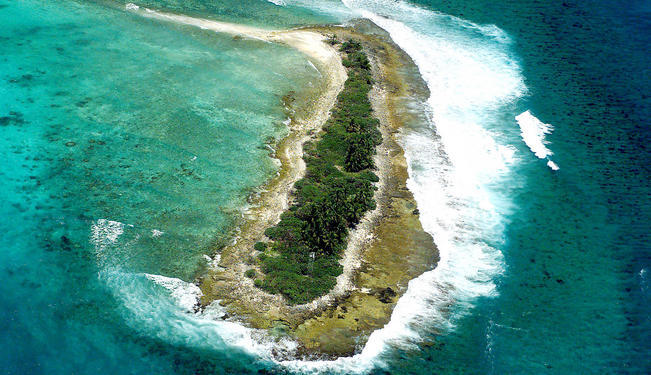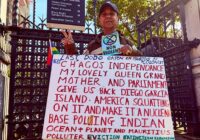By James Wan
Former residents of the Chagos Islands have lost their latest legal bid for the right to return following a European ruling. What next for the islanders?
Former residents of the Chagos Islands, located in the middle of the Indian Ocean, have lost their latest legal bid for their right to return home. The islanders’ fight to go back to the archipelago – from which they were brutally and illegally deported by the British government in the late-1960s – has been long and Sisyphean. Following battles in the UK High Court – which the islanders won – and the House of Lords – which they lost – the latest chapter saw the appeal go to the European Court of Human Rights (ECHR).
Many Chagossians and campaigners expected the ruling to go in their favour, but today the ECHR in Strasbourg declared that the islanders’ case is inadmissible on the grounds that the applicants previously received compensation from the British government, and that in accepting it had “effectively renounced” their right to bring any further claims. The court thus claimed it had no jurisdiction to try the case.
The news was understandably met with disappointment and dismay by the islanders and their supporters. The UK Chagos Support Association said that they were “saddened and shocked”. Bernadette Dugasse, who was a young girl when her family were forced off the islands to the Seychelles, commented “I did not receive a penny”.
A shameful past
The Chagos islanders' grievances began in the 1960s when the UK, which owns the territory, made a deal with the US. The UK offered to lease Diego Garcia, the biggest of the Chagos Islands, to the Americans who were looking to build a strategic military base in the Indian Ocean. In return, the UK would get a $14 million subsidy on Polaris missiles.
But there was a problem. Living on the islands were nearly 2,000 residents who were part of a community that had been there for several generations, in which time they had built up villages, schools, churches and stores – a living, working and, according to community recollections, happy society.
The US, however, needed the islands cleared. And so, in what has been referred to as one of the most shameful episodes of Britain’s colonial past, the UK government lied to deceive the international community and illegally exiled the entire population. While this was happening, UK diplomats and civil servants sent each other messages explaining the need “to maintain the pretence there were no permanent inhabitants” lest they be recognised as a people “whose democratic rights have to be safeguarded”, and wrote internal documents with subtitles such as “Maintaining the Fiction”.
The Chagos islanders were dumped with virtually nothing in the Seychelles and Mauritius. Many committed suicide shortly after and many continue to live in poverty today. The campaign for recognition and the right to return, however, has remained strong over the years, and after being recognised as legally British, many have since moved to Britain.
A questionable ruling
In the ECHR’s ruling, the court acknowledged the “callous and shameful treatment” suffered in the past, but claimed a compensation package paid 30 years ago had put the issue to bed. Indeed, in 1982, after pressure from Chagossian campaigners, the UK government authorised money to be distributed to the islanders in exchange for them renouncing their right to return to the islands. "These proceedings were settled in 1982 on payment of £4 million [$6 million] by the United Kingdom and provision of land worth £1 million [$1.5 million] by Mauritius", read the judges’ decision. “In so settling, the islanders agreed to give up their claims”. This seems to be what the ECHR’s decision hinged on. But there are, arguably, a number of problems with this argument.
To begin with, many Chagossians never received compensation. The European judges pre-empt this critique, saying “any other islanders – not part of the 471 islanders involved in the settlement – had to have been aware of the proceedings, which were widely known, and could have made claims and thus taken advantage of the settlement offer put forward or, if they preferred, pursued their claims in the domestic court proceedings”.
But this too is questionable. Firstly, the argument does not hold for the several hundreds of islanders deported to the Seychelles rather than Mauritius where the compensation was paid. “We were completely excluded from compensation”, Bernadette Dugasse told Think Africa Press earlier this year. “Chagossians from Seychelles were not even given half a penny, not even a teaspoonful of land.” The full ruling barely acknowledges this.
Secondly, the suggestion that the exiled Chagossians could have pursued the matter in the courts had they “preferred” is dubious at best. According to Mark Lattimer, executive director of Minority Rights Group, “it is frankly ridiculous to expect that a people from the Indian Ocean, some of whom were illiterate, and who have been thrown into abject poverty, to have the means and the wherewithal to pursue the British government in the English court”.
In fact, even the notion that Chagossians who did get compensation renounced their right to return rests on shaky ground. Putting aside the fact that the compensation was derisory, it is notable that the documents were in English, which most Chagossians did not speak, and that many were illiterate and had to sign with thumbprints. Although the UK government claims that lawyers were present to explain the documents, many islanders have long insisted they had no idea they were signing away their right to return, and that had they known they would never have accepted the compensation.
A set-back in a long struggle
The ECHR ruling is undoubtedly a significant set-back for the Chagossian community who wish to return to the islands. But their fight is not over. As Jeremy Corbyn, MP and chairperson of the Chagos All Party Parliamentary Group, commented to Think Africa Press, “When they were dumped in Mauritius and Seychelles, they could have just gone to the four winds but they didn’t. They stayed together as a community and they fought together as a community.” Traditionally led by strong, outspoken women – one of whom, Charlezia Alexia, passed away just earlier this week – it does not seem to be in the DNA of the campaigners to give up or waver in their struggle.
But sadly for them, the same can be said of the UK government which has now spent millions of taxpayers’ money on expensive legal battles over the last 12 years. The case only reached the ECHR because all British avenues were exhausted. In 2000, the UK High Court ruled that the removal of the Chagossians had been illegal and granted the islanders the right to resettle. In 2004, however, the UK government employed a rarely used royal prerogative called an Order in Council, which bypasses all democratic institutions, to ban the right to return.
In 2006, the UK High Court overturned the Order in Council deeming it to have been illegal, and then rejected the government’s appeal of the decision a year later in 2007. In its next throw of the dice, however, the government brought the case to the House of Lords in 2008, which in a 3:2 ruling voted against the islanders.
Bring it on
Following today’s defeat at the ECHR, campaigners will be looking forwards to next year and another legal challenge – this one in UK courts and against the establishment of a controversial marine protection area around the islands, which a leaked cable suggests may have been set up with the intention of preventing the islanders to return. As Lattimer pointed out, “The legal fight hasn’t finished. One major avenue may have come to an end, but the legal fight continues.” And as Dugasse said following the ECHR ruling: “I will fight on until I die”.
The views expressed in this article are the author's own and do not necessarily reflect Fair Observer’s editorial policy.
*[This article was originally published by Think Africa Press on December 20, 2012.]
Support Fair Observer
We rely on your support for our independence, diversity and quality.
For more than 10 years, Fair Observer has been free, fair and independent. No billionaire owns us, no advertisers control us. We are a reader-supported nonprofit. Unlike many other publications, we keep our content free for readers regardless of where they live or whether they can afford to pay. We have no paywalls and no ads.
In the post-truth era of fake news, echo chambers and filter bubbles, we publish a plurality of perspectives from around the world. Anyone can publish with us, but everyone goes through a rigorous editorial process. So, you get fact-checked, well-reasoned content instead of noise.
We publish 2,500+ voices from 90+ countries. We also conduct education and training programs
on subjects ranging from digital media and journalism to writing and critical thinking. This
doesn’t come cheap. Servers, editors, trainers and web developers cost
money.
Please consider supporting us on a regular basis as a recurring donor or a
sustaining member.
Will you support FO’s journalism?
We rely on your support for our independence, diversity and quality.






Comment